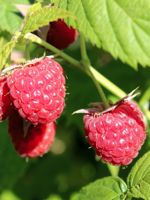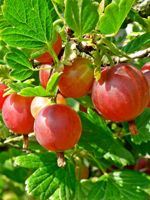Mon-Fri 9am - 5pm Mountain time
Boyne Raspberry vs Sebastien Gooseberry
Rubus sp. Boyne
Ribes uva-crispa Sebastien
NOT AVAILABLE THIS SEASON - MIGHT RETURN
(new stock expected: fall of 2026)
The Boyne Raspberry is a classic red raspberry, with a deep red color and juicy, sweet taste. It’s great for fresh eating, desserts and jams. It is a medium-sized shrub that produces ready to pick heart-shaped berries from early to mid summer and is high-yielding.
Boyne Raspberry is a floricane-fruiting variety, meaning it primarily produces fruit on second-year canes (previous season’s new growth). They are also referred to as summer-bearing. In late winter or early spring, cut back all spent floricanes, leaving only last season's canes.
Raspberries are self-fertile, meaning they do not require cross-pollination from another variety to produce fruit.
Sebastien Gooseberry is a nearly thornless variety that produces medium-sized, red gooseberries. When the berries are fully ripe they are quite sweet and great for fresh eating. They can be stored for up to two weeks in the fridge. For baking and preserves, they are often picked when under-ripe when they are firm and tart. The general harvest period is anywhere from July to September.
Sebastien Gooseberry is a Canadian variety that was developed at the Agriculture and Agri-Food Canada research station in Ottawa.
Gooseberries are self-pollinating but planting with another variety will increase yields.
Boyne Raspberry Quick Facts
Sebastien Gooseberry Quick Facts
Toxicity: leaves are toxic to humans

